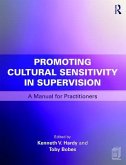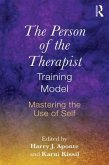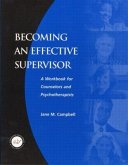Robert E. Lee (USA Florida State University), Thorana S. Nelson (USA Utah State University), Toni S. Zimmerman
The Contemporary Relational Supervisor 2nd edition
Robert E. Lee (USA Florida State University), Thorana S. Nelson (USA Utah State University), Toni S. Zimmerman
The Contemporary Relational Supervisor 2nd edition
- Broschiertes Buch
- Merkliste
- Auf die Merkliste
- Bewerten Bewerten
- Teilen
- Produkt teilen
- Produkterinnerung
- Produkterinnerung
The Contemporary Relational Supervisor 2nd edition is an empirically based, academically sophisticated, and learner-friendly text on the cutting edge of couple and family therapy supervision.
Andere Kunden interessierten sich auch für
![Promoting Cultural Sensitivity in Supervision Promoting Cultural Sensitivity in Supervision]() Promoting Cultural Sensitivity in Supervision42,99 €
Promoting Cultural Sensitivity in Supervision42,99 €![The Contemporary Relational Supervisor The Contemporary Relational Supervisor]() Robert E. Lee (USA Florida State University)The Contemporary Relational Supervisor45,99 €
Robert E. Lee (USA Florida State University)The Contemporary Relational Supervisor45,99 €![The Person of the Therapist Training Model The Person of the Therapist Training Model]() The Person of the Therapist Training Model40,99 €
The Person of the Therapist Training Model40,99 €![Becoming an Effective Supervisor Becoming an Effective Supervisor]() Jane CampbellBecoming an Effective Supervisor59,99 €
Jane CampbellBecoming an Effective Supervisor59,99 €![Ethics and Professional Issues in Couple and Family Therapy Ethics and Professional Issues in Couple and Family Therapy]() Ethics and Professional Issues in Couple and Family Therapy66,99 €
Ethics and Professional Issues in Couple and Family Therapy66,99 €![Family-Focused Treatment for Child and Adolescent Mental Health Family-Focused Treatment for Child and Adolescent Mental Health]() Paul SunseriFamily-Focused Treatment for Child and Adolescent Mental Health34,99 €
Paul SunseriFamily-Focused Treatment for Child and Adolescent Mental Health34,99 €![Navigating Family Estrangement Navigating Family Estrangement]() Karl MelvinNavigating Family Estrangement29,99 €
Karl MelvinNavigating Family Estrangement29,99 €-
-
-
The Contemporary Relational Supervisor 2nd edition is an empirically based, academically sophisticated, and learner-friendly text on the cutting edge of couple and family therapy supervision.
Produktdetails
- Produktdetails
- Verlag: Taylor & Francis Ltd
- 2 ed
- Seitenzahl: 294
- Erscheinungstermin: 12. August 2021
- Englisch
- Abmessung: 229mm x 152mm x 16mm
- Gewicht: 434g
- ISBN-13: 9780367568962
- ISBN-10: 0367568969
- Artikelnr.: 62114716
- Herstellerkennzeichnung
- Libri GmbH
- Europaallee 1
- 36244 Bad Hersfeld
- gpsr@libri.de
- Verlag: Taylor & Francis Ltd
- 2 ed
- Seitenzahl: 294
- Erscheinungstermin: 12. August 2021
- Englisch
- Abmessung: 229mm x 152mm x 16mm
- Gewicht: 434g
- ISBN-13: 9780367568962
- ISBN-10: 0367568969
- Artikelnr.: 62114716
- Herstellerkennzeichnung
- Libri GmbH
- Europaallee 1
- 36244 Bad Hersfeld
- gpsr@libri.de
Robert E. Lee is a senior family science researcher and couple and family clinician who has shaped major academic CFT training programs and served on organizational and governmental panels and boards. Thorana S. Nelson is a couple and family therapist, supervisor, and educator. She developed and has taught in the AAMFT Foundations of Family Therapy Supervision online course.
PART I: Understanding the Supervisory Process: An Overview
1: Basic Ingredients in the Supervisory Process
2: Systemic Supervisory Relationships, Roles, and Goals
3: Getting Started: Readiness and Procedures
4: Screening, Contracts, Core Competencies, Evaluation, and Feedback-Centered Supervision
PART II: Relational Supervision Practices
5: A Closer Look at Supervision Formats
6: Approaches to Supervision
7: Effective Supervision According to the Literature
8: Supervision Based on Core Competencies
9: Supervising Manual-Based Models
PART III: Contextual Considerations
10: Contextual Aspects of Supervision: Settings, Culture, and Self
11: Legal Aspects of Relational Supervision
12: Ethical Considerations in Relational Supervision
13: Self of the Therapist, Self of the Supervisor
PART IV: Troubleshooting and Writing a Personal Philosophy of Supervision Paper
14: Troubleshooting and Pragmatics in the Relational Training System
15: Developing Your Personal Philosophy of Supervision Paper
1: Basic Ingredients in the Supervisory Process
2: Systemic Supervisory Relationships, Roles, and Goals
3: Getting Started: Readiness and Procedures
4: Screening, Contracts, Core Competencies, Evaluation, and Feedback-Centered Supervision
PART II: Relational Supervision Practices
5: A Closer Look at Supervision Formats
6: Approaches to Supervision
7: Effective Supervision According to the Literature
8: Supervision Based on Core Competencies
9: Supervising Manual-Based Models
PART III: Contextual Considerations
10: Contextual Aspects of Supervision: Settings, Culture, and Self
11: Legal Aspects of Relational Supervision
12: Ethical Considerations in Relational Supervision
13: Self of the Therapist, Self of the Supervisor
PART IV: Troubleshooting and Writing a Personal Philosophy of Supervision Paper
14: Troubleshooting and Pragmatics in the Relational Training System
15: Developing Your Personal Philosophy of Supervision Paper
PART I: Understanding the Supervisory Process: An Overview
1: Basic Ingredients in the Supervisory Process
2: Systemic Supervisory Relationships, Roles, and Goals
3: Getting Started: Readiness and Procedures
4: Screening, Contracts, Core Competencies, Evaluation, and Feedback-Centered Supervision
PART II: Relational Supervision Practices
5: A Closer Look at Supervision Formats
6: Approaches to Supervision
7: Effective Supervision According to the Literature
8: Supervision Based on Core Competencies
9: Supervising Manual-Based Models
PART III: Contextual Considerations
10: Contextual Aspects of Supervision: Settings, Culture, and Self
11: Legal Aspects of Relational Supervision
12: Ethical Considerations in Relational Supervision
13: Self of the Therapist, Self of the Supervisor
PART IV: Troubleshooting and Writing a Personal Philosophy of Supervision Paper
14: Troubleshooting and Pragmatics in the Relational Training System
15: Developing Your Personal Philosophy of Supervision Paper
1: Basic Ingredients in the Supervisory Process
2: Systemic Supervisory Relationships, Roles, and Goals
3: Getting Started: Readiness and Procedures
4: Screening, Contracts, Core Competencies, Evaluation, and Feedback-Centered Supervision
PART II: Relational Supervision Practices
5: A Closer Look at Supervision Formats
6: Approaches to Supervision
7: Effective Supervision According to the Literature
8: Supervision Based on Core Competencies
9: Supervising Manual-Based Models
PART III: Contextual Considerations
10: Contextual Aspects of Supervision: Settings, Culture, and Self
11: Legal Aspects of Relational Supervision
12: Ethical Considerations in Relational Supervision
13: Self of the Therapist, Self of the Supervisor
PART IV: Troubleshooting and Writing a Personal Philosophy of Supervision Paper
14: Troubleshooting and Pragmatics in the Relational Training System
15: Developing Your Personal Philosophy of Supervision Paper









